
The Vancouver Canucks are a professional ice hockey team based in Vancouver. The Canucks compete in the National Hockey League (NHL) as a member of the Pacific Division of the Western Conference, and play their home games at Rogers Arena. Rick Tocchet is the head coach, Jim Rutherford serves as the president of hockey operations, and Patrik Allvin serves as the general manager.
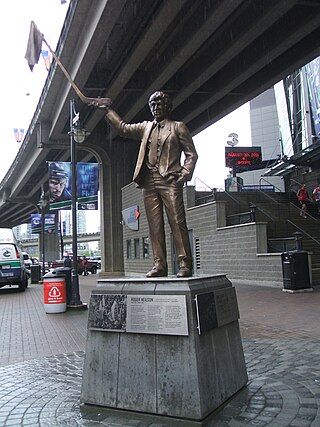
Roger Paul Neilson, was a Canadian professional ice hockey coach, most notably in the NHL, where he served with eight teams. Known as Captain Video because of his technological contributions to the game, he is a member of the Hockey Hall of Fame in the builder category. Alongside his decorated coaching abilities, Neilson is commonly remembered today for his many antics which resulted in the creation of several NHL rules.

Roberto Luongo is a Canadian former professional ice hockey goaltender. He played 19 seasons in the National Hockey League (NHL) for the New York Islanders, Florida Panthers, and the Vancouver Canucks. In 2022, Luongo was inducted into the Hockey Hall of Fame. Luongo is a two-time NHL All-Star and a winner of the William M. Jennings Trophy for backstopping his team to the lowest goals against average in the league. He was a finalist for several awards, including the Vezina Trophy as the league's best goaltender, the Lester B. Pearson Award as the top player voted by his peers, and the Hart Memorial Trophy as the league's most valuable player (2007). Luongo is second all time in games played as an NHL goaltender (1,044) and fourth all time in wins (489). He employed the butterfly style of goaltending.

Kirk Alan McLean is a Canadian former professional ice hockey goaltender who played in the National Hockey League (NHL) for the New Jersey Devils, Vancouver Canucks, Carolina Hurricanes, Florida Panthers and New York Rangers. He played in the style of a stand-up goaltender.

Stanley Philip Smyl is a Canadian professional ice hockey executive and former player. He was selected 40th overall by the Vancouver Canucks in the 1978 NHL Amateur Draft and went on to play his entire NHL career with the team until his retirement in 1991. He featured in the 1982 Stanley Cup Finals with the Canucks.

Christopher Robert Higgins is an American former professional ice hockey winger and current Skills and Development coach for the Vancouver Canucks of the National Hockey League (NHL). While playing college hockey, he was selected 14th overall by the Montreal Canadiens in the first round of the 2002 NHL Entry Draft. He finished a two-year career with the Yale Bulldogs, earning ECAC Hockey Player of the Year honors as a sophomore, before turning professional for the 2003–04 season. After two seasons with the Canadiens' minor league affiliate, the Hamilton Bulldogs of the American Hockey League (AHL), he joined the NHL in 2005–06. He recorded three consecutive 20-goal seasons to begin his NHL career before being traded to the New York Rangers in June 2009. After brief stints with the Rangers, Calgary Flames and Florida Panthers, he joined the Vancouver Canucks in February 2011. Internationally, Higgins has competed for the United States in two World Junior Championships and one World Championship (2009).
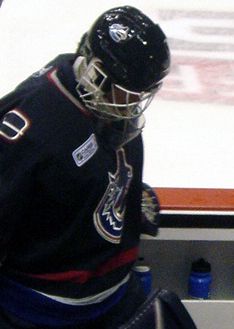
Daniel Cloutier is a Canadian former professional ice hockey goaltender. In his 10-year National Hockey League (NHL) career, Cloutier played with the New York Rangers, Tampa Bay Lightning, Vancouver Canucks and Los Angeles Kings, spending the majority of his career in Vancouver. He employed a combination of both butterfly and stand-up goaltending and was known for wearing the uncommon birdcage style helmet.

Alain Vigneault is a Canadian former professional ice hockey coach. Vigneault has previously coached the Montreal Canadiens, Vancouver Canucks, New York Rangers and the Philadelphia Flyers for 19 seasons in the NHL, as well as in the Quebec Major Junior Hockey League (QMJHL). During his career with the Canucks, he won the Jack Adams Award as the NHL's top coach of the year in 2006–07 and became the team's record holder for wins as a coach. Under Vigneault, Vancouver won back-to-back Presidents' Trophies and made one Stanley Cup Finals appearance (2011). In his first season with New York, he led the Rangers to their first Stanley Cup Finals appearance (2014) in 20 years and a Presidents' Trophy in 2014–15.
Harold Watson Neale is a Canadian retired NCAA, NHL and WHA coach and general manager, and ice hockey broadcaster.
The 1978–79 NHL season was the 62nd season of the National Hockey League. The Montreal Canadiens beat the New York Rangers in the Stanley Cup finals four games to one for their fourth consecutive Cup; two "Original Six" teams would not meet again in the Finals for the next 34 years, when Chicago Blackhawks defeated the Boston Bruins in the 2013 Finals. The Bruins faced the Canadiens in the 1979 semifinals, marking the last appearance by three Original Six teams in the final four for the next 35 years, when the Blackhawks, Canadiens and Rangers reached the semifinals of the 2014 playoffs.
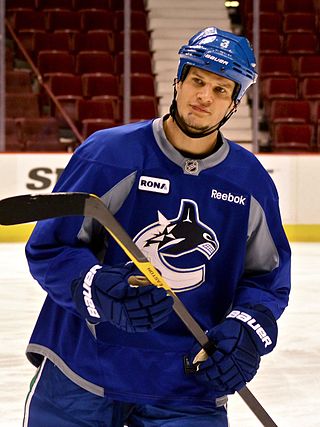
Kevin Francesco Bieksa is a Canadian former professional ice hockey defenceman. Bieksa started and played most of his career with the Vancouver Canucks and later played for the Anaheim Ducks. After a three-year career in the Ontario Junior Hockey League (OJHL) with the Burlington Cougars, Bieksa was awarded a scholarship to Bowling Green State University. He was a one-time All-CCHA honourable mention during his four-year tenure with the Falcons of the Central Collegiate Hockey Association (CCHA). He graduated from the university with a bachelor's degree (B.A.) in finance, and was a two-time CCHA All-Academic honourable mention in 2003 and 2004. Bieksa now co-hosts Hockey Night in Canada.
The 2006–07 Vancouver Canucks season was the Canucks' 37th NHL season.
The history of the Vancouver Canucks begins when the team joined the National Hockey League (NHL). Founded as an expansion team in 1970 along with the Buffalo Sabres, the Vancouver Canucks were the first NHL team to be based in Vancouver. They adopted the name of the minor professional hockey team that had existed in Vancouver since 1945.
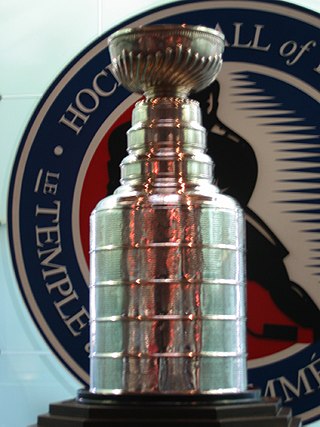
The 1982 Stanley Cup playoffs, the playoff tournament of the National Hockey League (NHL) began on April 7, after the conclusion of the 1981–82 NHL season. The playoffs concluded on May 16 with the champion New York Islanders defeating the Vancouver Canucks 3–1 to win the final series four games to none and win the Stanley Cup.
The 1983–84 Vancouver Canucks season was the team's 14th in the National Hockey League (NHL).
The 1985–86 Vancouver Canucks season was the team's 16th in the National Hockey League (NHL).
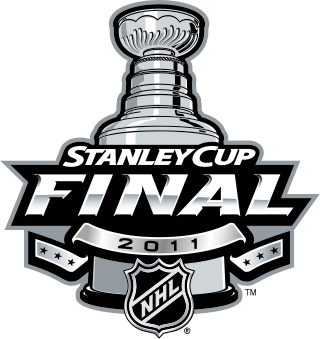
The 2011 Stanley Cup Finals was the championship series of the National Hockey League's (NHL) 2010–11 season, and the culmination of the 2011 Stanley Cup playoffs. The Eastern Conference champion Boston Bruins defeated the Western Conference champion Vancouver Canucks four games to three. The Bruins ended a 39-year Stanley Cup drought with the victory. Bruins goaltender Tim Thomas was awarded the Conn Smythe Trophy as the Most Valuable Player of the playoffs.
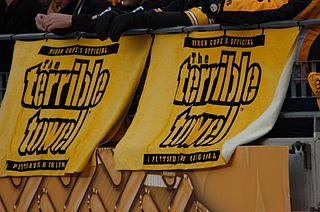
A rally towel is a sports paraphernalia item and a type of towel often used as a fan symbol in American and Canadian sports events. The prototype of the modern rally towel was created in 1975 by former Pittsburgh Steelers radio broadcaster Myron Cope and is known as the Terrible Towel. Although, it could be argued the great coach E.A Diddle of the Western Kentucky Hilltoppers truly created the rally towel in the 1940s. Western Kentucky would also trademark the term "The Red Towel" in 1971; 4 years before Myron Cope created the Pittsburgh Steelers "terrible towel".















